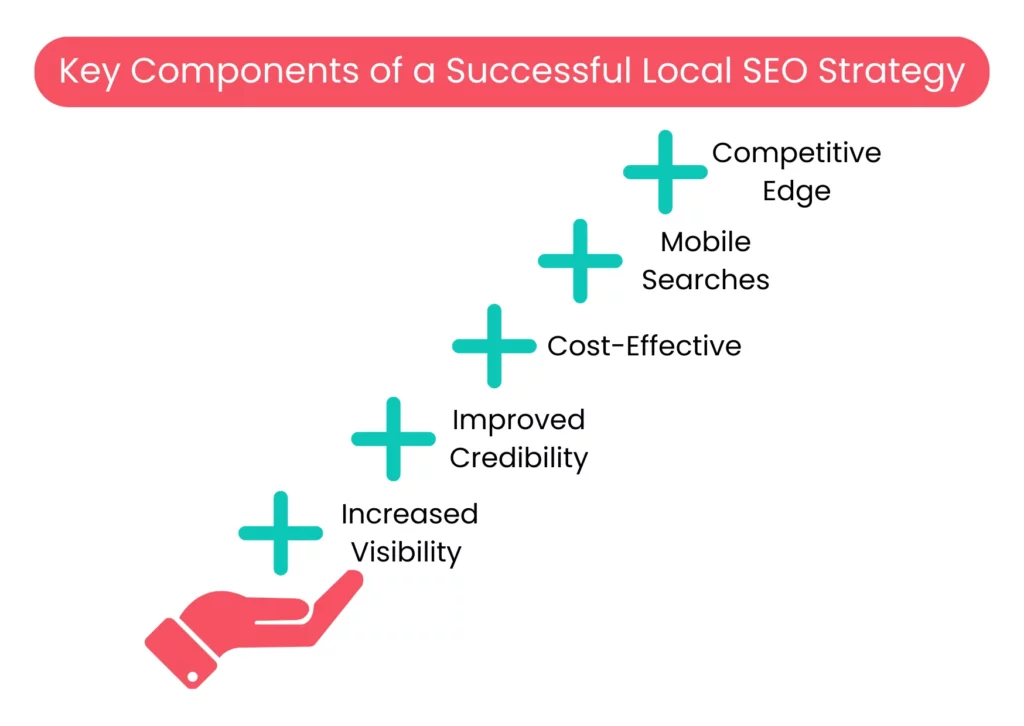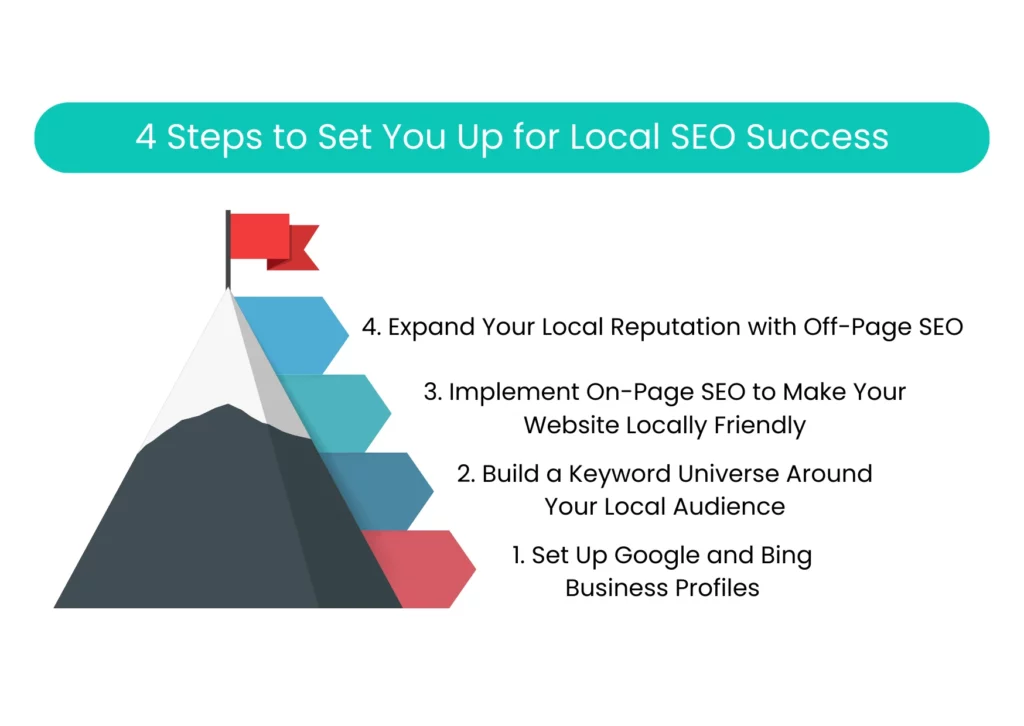
Small businesses often find it hard to get noticed online these days because of increasing competition. Local SEO has changed this by giving them a powerful way to boost their online presence and attract local customers. But with search engine algorithms deciding who gets seen, how can small businesses use local SEO effectively to succeed in their communities?
Even if you put a lot of effort into your business, it can still be hard for potential customers to find you online. Many small businesses struggle with this problem. How can you stand out from all the other businesses online and get noticed locally? This is a challenge that many small businesses face when trying to use local SEO effectively.
In this detailed blog, let’s explore practical local SEO strategies designed specifically for small businesses to improve their local online presence.
Table of contents
- What is Local SEO?
- Why is Local SEO Important for Small Businesses?
- What is the Role of Artificial Intelligence in Local SEO?
- How Can AI Help Local SEO Efforts?
- 1. Analyze Business Listings and Rankings
- 2. Perform Competitor Analysis
- 3. Provide Optimization Recommendations
- 4. Automate Keyword Research and Content Creation
- 5. Assist with Website and Content Optimization
- 6. Predict and Analyze User Behavior
- 7. Offer Locally Relevant Insights
- 8. Enhance User Experiences
- 4 Steps to Set You Up for Local SEO Success
- 8 Top Local SEO Tools
- Conclusion
What is Local SEO?
Local SEO, short for Local Search Engine Optimization, is about making your business more visible in local search results online. When people search for something in your area, your business should appear prominently in those search results.
To achieve this, local SEO involves tactics like improving your website, managing online business listings, and encouraging customer reviews. If you own a business, it’s important to focus on boosting your SEO locally.
Why is Local SEO Important for Small Businesses?
Local SEO helps you connect with people nearby who are actively searching for what you offer. It’s like local advertising that boosts your visibility to local customers. For small businesses, this is crucial because it focuses your marketing on potential customers who are likely to visit your store or use your services.
Using local SEO can also strengthen your relationship with customers, making them more inclined to choose you over competitors in the future. Positive feedback from satisfied customers can lead to more recommendations and potential new customers.
Key Components of a Successful Local SEO Strategy

1. Increased Visibility
When you optimize your business to show up in local online searches, you have a better chance of appearing on the first page of search results. Being in the top listings means more potential customers are likely to click on your business. Most people don’t look past the first page of search results, so being visible there is really important. Some businesses pay to be at the top, but improving your local SEO can get you there without extra costs.
2. Improved Credibility
A strong local online presence helps build trust in your business. When customers see your business listed consistently across different websites with good reviews, they see you as reliable. Being open and honest online through local SEO makes your business seem more genuine and trustworthy. Customers like feeling connected to the brands they choose, whether they find them through SEO or other types of advertising.
3. Cost-Effective
Local SEO is affordable, especially for small businesses. Compared to traditional advertising like ads in newspapers or on billboards, digital marketing costs less and brings better results. You can focus your efforts where they matter most. Targeted marketing is better than trying to reach everyone because it saves money and connects better with customers.
4. Mobile Searches
More people are using their phones to search for local businesses. If your small business isn’t set up for local search, you could miss out on a lot of potential customers. Most internet searches happen on mobile devices, so it’s crucial for your business to work well on phones and tablets to reach people who are on the move.
5. Competitive Edge
Investing in local SEO gives your small business an advantage over competitors who aren’t focusing on local search. It helps you stand out and compete with bigger businesses that aren’t as focused on your local area. Getting into local SEO early can bring in customers before your competitors catch on.
As technology keeps advancing, SEO will become even more important for reaching new customers online. Businesses that don’t start using local SEO now might fall behind in the future.
What is the Role of Artificial Intelligence in Local SEO?
Artificial intelligence (AI) has come a long way in recent years. AI has made a big difference in search engine optimization (SEO) by helping with keyword research, predicting searches, and creating content. For example, AI tools can look at large amounts of data to find the best keywords and predict what people will search for, which helps businesses create content that ranks higher in search results.
For business owners, using AI in local SEO strategies brings many benefits. AI tools can help create content outlines, rewrite text, and make metadata, making the content creation process easier. While AI-generated content might need some tweaking to match human quality and avoid SEO issues, these tools save a lot of time and effort. By using AI for analytics, automation, and personalization, businesses can improve their search rankings, attract more customers, and increase sales. As technology keeps evolving, adopting AI-driven SEO practices is becoming essential for small businesses to succeed in the digital world. By embracing AI, small businesses can set themselves up for long-term success and growth in their local communities.
How Can AI Help Local SEO Efforts?
The rise of AI presents a lot of opportunities for enhancing local SEO. While using generative AI to boost content production is one notable application, there are many other AI technologies that can significantly improve local SEO in various ways. Here are some key ways AI can enhance your SEO strategy:
1. Analyze Business Listings and Rankings
- Time-Saving Analysis: Manual analysis of business listing rankings can be extremely time-consuming. AI-powered tools can automate this task, saving you valuable time and effort.
- Identifying Weaknesses: If your Google Business Profile listing is underperforming, you can run local rank tracking scans with AI. Instead of manually identifying trends and weaknesses, AI can quickly analyze your listing’s health and suggest improvements.
2. Perform Competitor Analysis
- Competitor Listing Analysis: AI tools can analyze not only your business listings but also those of your competitors. This provides accurate competitor analysis.
- Efficient Comparison: This analysis saves you from manually comparing your listings with those of competitors, allowing you to identify gaps and opportunities more efficiently.
- Strategic Advantage: By understanding your competitors’ strengths and weaknesses, you can develop strategies to outrank them for specific keywords and in particular areas.
3. Provide Optimization Recommendations
- Actionable Insights: AI can provide a list of actionable optimization recommendations. For example, offering prioritized recommendations, categorized as major or minor optimizations.
- Optimization Checklist: This feature essentially gives you a checklist of tasks to improve your rankings immediately, which is particularly useful for multi-location businesses managing numerous listings across different platforms.
- Maintaining Consistency: For multi-location businesses, maintaining up-to-date and accurate business information across platforms is crucial. AI helps ensure consistency by highlighting easy fixes, such as missing or incorrect details in a location’s listing.
4. Automate Keyword Research and Content Creation
- Keyword Discovery: AI can help identify keywords people are currently using to find businesses like yours and predict future local search terms for optimization. Adsby’s AI Keyword Generator Tool helps you find these relevant keywords.
- Long-Tail Keywords: AI is particularly effective at identifying long-tail keywords and conversational search phrases used in voice queries.
- Content Creation Speed: Generative AI technology can speed up content creation, incorporating new local keywords creatively and effectively. You can craft compelling seo content quickly with Adsby’s AI.
5. Assist with Website and Content Optimization
- Technical Performance Analysis: AI can analyze your website’s performance and suggest technical improvements, which search engines consider in their rankings.
- Optimizing Existing Content: If your existing content isn’t performing well in local searches, AI can assist by conducting keyword research and rewriting content to include new relevant keywords.
6. Predict and Analyze User Behavior
- Data Analysis: AI can process large amounts of data to predict user behavior. This helps tailor your business listings, websites, and content to meet user needs, enhancing local relevance for search engines.
7. Offer Locally Relevant Insights
- Contextual Understanding: AI can provide insights specific to local trends and preferences, allowing you to tailor your SEO strategies to the unique characteristics of your target market.
8. Enhance User Experiences
- User Behavior Prediction: By analyzing and predicting user behavior, AI helps optimize your website for a better user experience, benefiting local SEO.
- AI-Powered Chatbots: Implementing AI-powered chatbots on your website can improve user experience by:
- Answering relevant queries.
- Providing personalized 24-hour customer service.
- Gathering data about customer behavior.
4 Steps to Set You Up for Local SEO Success

Local SEO (Search Engine Optimization) is essential for businesses that serve specific geographic areas. Unlike traditional SEO, which aims to rank globally or nationally, local SEO focuses on optimizing your online presence to attract more business from relevant local searches.
1. Set Up Google and Bing Business Profiles
Why it matters:
- Visibility and Accessibility: Google Business Profile and Bing Places for Business act as your digital storefronts on these search engines. They display important information about your business directly in search results and maps.
- Free and Easy: Setting up these profiles is free and relatively straightforward. It’s a fundamental step to ensure potential customers can find and contact you easily.
How to do it:
- Create or Claim Your Listing: Visit Google Business Profile Manager and Bing Places for Business, then follow the prompts to either claim an existing listing or create a new one.
- Provide Comprehensive Information: Fill in all details accurately, including your business name, address, phone number, website URL, hours of operation, and business category.
- Verification Process: Google and Bing verify your business to ensure the accuracy of the information provided, typically through email or phone verification.
- Engage with Customers: Regularly update your profiles with new photos, posts, and announcements. Respond to customer reviews promptly to build trust and credibility.
2. Build a Keyword Universe Around Your Local Audience
Why it matters:
- Targeted Visibility: Local keyword optimization involves using phrases that local customers are likely to use when searching for businesses like yours.
- Attracting the Right Audience: By targeting specific local keywords (e.g., “plumber in New York City” or “best pizza near me”), you attract more relevant traffic to your website.
How to do it:
- Keyword Research: Use tools like Free Keyword Generator, Semrush, Ahrefs, or Google Keyword Planner to identify local keywords relevant to your business.
- Content Optimization: Incorporate these keywords naturally into your website’s content, meta tags, headings, and URLs. Avoid overusing keywords (keyword stuffing), as this can harm your SEO efforts.
3. Implement On-Page SEO to Make Your Website Locally Friendly
Why it matters:
- Improved Visibility: On-page SEO involves optimizing elements on your website to make it easier for search engines to understand and rank your content.
- User Experience: A locally optimized website enhances user experience, making it more likely for visitors to convert into customers.
How to do it:
- Optimize Content: Use local keywords strategically in title tags, meta descriptions, headings (H1, H2), and throughout your content.
- Create Location-Specific Pages: If your business serves multiple locations, create dedicated pages for each location. Include location-specific content and keywords.
- Mobile-Friendliness: Ensure your website is responsive and performs well on mobile devices. Mobile-friendly sites are favored in search engine rankings.
- Schema Markup: Implement local business schema markup to provide search engines with structured data about your business, such as hours of operation, reviews, and address details.
4. Expand Your Local Reputation with Off-Page SEO
Why it matters:
- Authority and Trust: Off-page SEO activities help build your business’s authority and trustworthiness across the web.
- Backlinks and Citations: Getting mentioned on reputable local websites and directories through backlinks and citations improves your site’s credibility and SEO rankings.
How to do it:
- Local Link Building: Collaborate with local businesses, sponsor local events, and reach out to local media for coverage. Earned backlinks from local sources can significantly boost your local SEO.
- Local Directories: Claim and optimize your business listings on platforms like Yelp, Yellow Pages, and local chambers of commerce websites.
- Customer Reviews: Encourage satisfied customers to leave reviews on platforms like Google My Business, Yelp, and Facebook. Positive reviews not only influence potential customers but also improve your local search visibility.
By implementing these steps effectively, you can establish a strong foundation for local SEO success. Consistency, relevance, and engagement are key principles that will help your business attract more local customers and grow organically through online search channels.
7 Top Local SEO Tools
1. GrowthBar
- Continuous Improvement: Boosting your site’s search engine visibility isn’t a one-time task. It requires ongoing maintenance and tracking, and GrowthBar helps you keep up.
- Versatile Tool: Available as a standalone tool or a Chrome extension, it tracks top keywords for any website.
- Competitor Analysis: Track keywords on your site and monitor your competitors’ keyword authority.
- Rank Tracking: The built-in rank tracker monitors which domains rank well for specific keywords.
2. SEMrush Listing Management Tool
- Directory Listings: Adding your business to trusted online directories is crucial for visibility and search rankings.
- Easy Management: SEMrush Listing Management Tool helps you check, track, and update business information across multiple directories.
- Local Rankings: Track your business ranking in your location or target cities and stay on top of customer reviews.
3. BiQ
- Comprehensive Tool: BiQ offers advantages similar to other local SEO tools but on a larger scale.
- Keyword Tracking: Track rankings for up to 1,000 keywords in real-time.
- Multiple Languages: The interface supports multiple languages and is available as a smartphone app.
- Additional Features: Analyze keywords, develop content marketing ideas, and identify gaps between you and your competitors.
4. GeoRanker
- Location-Based Ranking: Optimize for different locations and compare your rankings to competitors with GeoRanker.
- User-Friendly Heatmaps: See how well a website ranks in specific locations.
- Detailed Analytics: Includes keyword ranking features and a tool to track competitors’ citation sources.
- Strategy Improvement: Use this information to fine-tune your local SEO campaigns.
5. Local Falcon
- Specific Keyword Setup: Set up one keyword at a time and get detailed data.
- Local Search Analysis: Perform a thorough analysis of your local search efforts with Local Falcon.
- Optimization Insights: Make informed optimization decisions and predict their effects.
6. Synup
- Reputation Management: Track performance across search engines, review platforms, and directories.
- Citation Monitoring: Synup monitors over 200 directories and search engines for citation inconsistencies.
- Traffic and Rankings: Keeps track of ongoing traffic and web rankings.
- Review Alerts: Stay on top of new reviews and business comments.
7. BrightLocal
- Small Business Focus: Designed for small local business owners.
- Efficient Updates: Monitor or update citations across multiple directories in one process.
- Regular Audits: Audit local listings, on-site SEO, customer reviews, and other SEO signals with BrightLocal.
- Review Campaigns: Create and manage review campaigns easily.
These tools can help you improve your local SEO efforts, making it easier to manage listings, track rankings, analyze competitors, and enhance your overall online presence.
Conclusion
In conclusion, AI is a powerful tool for small businesses aiming to improve their local SEO strategies and achieve significant growth. By using AI-powered analytics, automation, and personalized approaches, businesses can boost their rankings in local search results, attract more interested customers, and ultimately increase sales and revenue.
As technology advances, adopting AI-driven SEO practices isn’t just a way to stay competitive. It’s essential for small businesses that want to thrive in today’s digital marketplace. By embracing innovation and using AI effectively, small businesses can set themselves up for long-term success and steady growth in their local communities.
Using AI in local SEO might seem challenging at first, but the benefits—like better visibility, targeted marketing efforts, and actionable insights—are well worth the effort. Embrace the future of SEO with AI and empower your small business to achieve new levels of success in your local market.